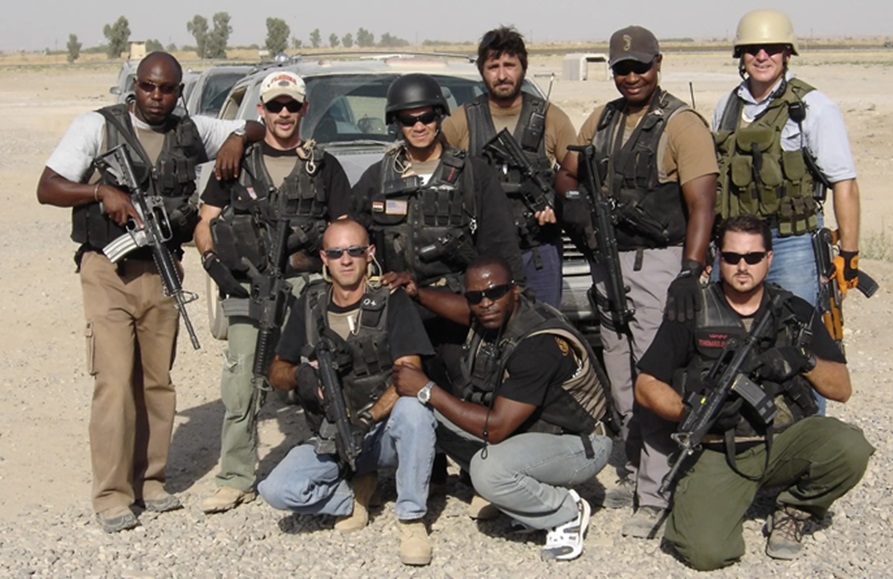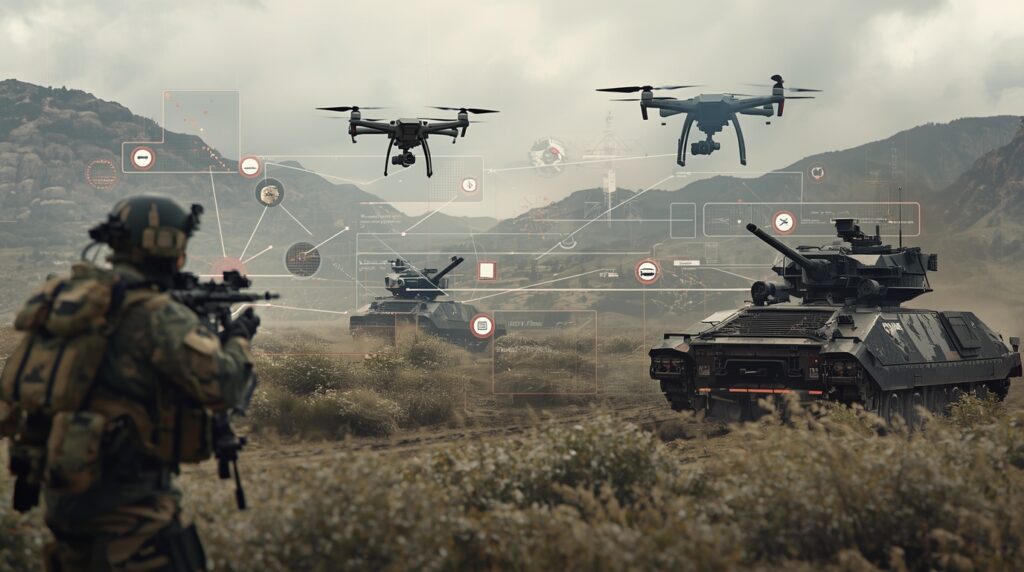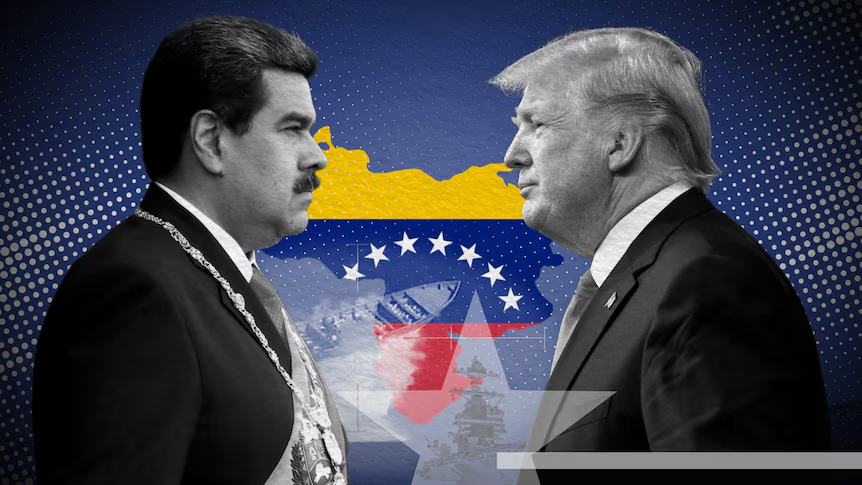Private Military and Security Companies (PMSCs) have become a major and sometimes contentious aspect of modern wars. Their responsibilities span from providing training and logistical assistance to leading combat operations, offering businesses and governments alike adaptable and frequently affordable options. The intricate effects of PMSCs on contemporary warfare are explored in this article, along with the moral conundrums they raise and the legal systems that control them. Let us explore how PMSCs have influenced the conflict and discuss wider implications for international security and governance using the Iraq War as a primary case study.
Historical Context of PMSCs
The concept of privatized military services is deeply rooted in history. From the hoplites of ancient Greece to the condottiere of Renaissance Italy, mercenaries have been used for millennia. However, the late 20th century saw the emergence of the contemporary PMSC sector, especially with the conclusion of the Cold War. The market for outsourced military and security services was formed by the decline in national military resources and the complexity of international conflicts. As a result, PMSCs grew in popularity and gave governments and businesses an alternative to regular military forces’ logistical and political limitations when it came to meeting security objectives (Singer, 2003).
The Role of PMSCs in Contemporary Conflicts:
In modern battles, PMSCs carry out a wide range of tasks, each of which has a big impact on how wars are fought and run.
- Protection and Security: PMSCs are regularly hired to offer security for employees, properties, and vital infrastructure. This covers the protection of convoys in hazardous situations, military installations, corporate headquarters, and embassies. The existence of PMSCs frees up national armed forces to concentrate on strategic goals and combat operations as opposed to standard protection tasks (Avant, 2005).
- Logistical Support: These businesses provide a wide range of logistical services, including equipment maintenance, supply chain management, and transportation. Through PMSCs, military operations are guaranteed the resources and support they need to run more smoothly and effectively. For example, PMSCs played a critical role in sustaining supply chains and handling the logistical challenges associated with extensive military activities in the Iraq War (Pelton, 2006).
- Training and Capacity Building: Local security forces and military personnel receive training services from PMSCs. This covers everything, from fundamental education to highly skilled tactical training. To increase domestic capability and lessen reliance on foreign forces, PMSCs trained a large portion of the Iraqi police and military (Schreier & Caparini, 2005).
- Intelligence and Surveillance: PMSCs can provide intelligence gathering and surveillance services thanks to their technology capabilities. These businesses can use drones, carry out electronic monitoring, and collect vital data for use in security and military activities (Singer, 2003).
- Direct Combat Support: While less frequent, certain PMSCs actively participate in military actions. In high-risk scenarios where conventional forces might be overextended or unavailable, they offer specialist combat groups that can be called upon (Pelton, 2006).
The Iraq War: A Case Study
One well-known instance of the widespread usage of PMSCs in contemporary conflicts is the Iraq War. After the U.S.-led invasion in 2003, PMSCs were heavily relied upon for several purposes during the war. A more thorough analysis of PMSCs’ functions and effects during the Iraq War is provided in this section.
- Security and Protection in Iraq
PMSCs were used to guard American diplomats, lawmakers, and business executives in Iraq during the conflict. To defend embassies, military bases, and convoys, businesses such as Triple Canopy, DynCorp, and Blackwater (later renamed Academi) were hired. High-value targets were successfully shielded from rebel attacks by these businesses (Schreier & Caparini, 2005). The presence of PMSCs allowed the U.S. military to focus on combat operations and strategic objectives, while private contractors handled security tasks.
- Logistical Support in Iraq
PMSCs were instrumental in maintaining the logistical backbone of U.S. and coalition forces in Iraq. Companies such as Halliburton/KBR provided essential services like transportation, food supply, and infrastructure maintenance. Their ability to manage complex supply chains and deliver resources efficiently was vital for the sustainment of military operations. The logistical support provided by PMSCs enabled military forces to operate more effectively and with greater flexibility (Pelton, 2006).
- Training and Capacity Building in Iraq
One of the primary missions of PMSCs in Iraq was to train and build the capacity of Iraqi security forces. This included training police officers, military personnel, and special forces units. PMSCs offered expertise in various areas, from basic combat training to advanced counterterrorism tactics. Companies like DynCorp and Military Professional Resources Inc. (MPRI) were heavily involved in these efforts. The goal was to create a self-sufficient Iraqi security apparatus capable of maintaining law and order independently (Avant, 2005).
- Intelligence and Surveillance in Iraq
PMSCs also contributed to intelligence and surveillance operations in Iraq. These companies utilized advanced technology, including drones and electronic surveillance equipment, to gather critical information. The intelligence gathered by PMSCs supported military operations, enabling more informed decision-making and enhancing overall situational awareness (Singer, 2003).
- Direct Combat Support in Iraq
While less common, some PMSCs were directly involved in combat operations in Iraq. These companies provided specialized combat units for high-risk missions, including hostage rescues and counterinsurgency operations. Their involvement in direct combat raised significant ethical and legal questions, particularly concerning the rules of engagement and accountability (Pelton, 2006).
Ethical Dilemmas Associated with PMSCs
Several ethical conundrums are raised when PMSCs are involved in military operations, mainly with responsibility, legality, and the possibility of human rights violations.
- Accountability and Legal Ambiguities: The accountability of PMSC employees is one of the main ethical issues. PMSCs frequently function in a grey area of international law, in contrast to regular military units, which are bound by stringent codes of conduct and legal frameworks. A lack of clear accountability may result in instances of abuse and misbehaviour. One glaring example of the fallout from insufficient control is the 2007 Nisour Square incident, in which Blackwater employees killed seventeen Iraqi civilians (Schreier & Caparini, 2005).
- Human Rights Violations: A lot of information has been released on human rights violations involving PMSCs. These include claims of extrajudicial executions, torture, and other types of maltreatment. The Abu Ghraib prison scandal involving PMSCs brought to light the possibility of abuse and the difficulties in guaranteeing that contractors follow human rights guidelines (Human Rights Watch, 2022).
- Mission Integrity vs. Profit Motive: There are instances when the objectives of military and humanitarian missions clash with the profit-driven nature of PMSCs. There have been documented cases of fraud, overbilling, and cost-cutting tactics that jeopardize service quality. This profit motivation has the potential to compromise mission integrity by driving decisions that put monetary gain ahead of morality and mission accomplishment (Avant, 2005).
- Effect on Local Communities: Local communities may be significantly impacted by PMSC presence in conflict areas. Even while they offer crucial security and assistance, their activities may have unforeseen repercussions. Tensions can be increased, for instance, by aggressive security measures and the use of force against the local populace. One of the biggest challenges facing PMSCs is striking a balance between the requirement for security and respect for local customs and communities (Singer, 2003).
Regulatory Structures Controlling PMSCs:
The intricate and frequently insufficient regulatory structures that govern PMSCs provide considerable obstacles to oversight and accountability.
- U.S. Regulatory Frameworks: The Federal Acquisition Regulation (FAR) and the Uniform Code of Military Justice (UCMJ) are two of the regulations that the U.S. government specifically regulates when it comes to contracting and managing PMSCs. Nevertheless, the creation and implementation of these laws did not keep up with the explosive growth of PMSC use in Iraq. The size and complexity of PMSC operations were frequently too much for the oversight procedures in place to handle (United States Government, 2022).
- Iraqi Legal Frameworks: Controlling the operations of PMSCs operating inside its borders presented serious difficulties for the Iraqi government. Enforcing laws and holding PMSCs accountable was challenging due to the continuous conflict and the absence of a strong legal framework. The Iraqi government found it difficult to enforce local regulations and exercise control over foreign contractors (Schreier & Caparini, 2005).
- International Initiatives: Although non-binding international initiatives like the Montreux Document offer recommendations on best practices for the use of PMSCs, their usefulness is limited. There are still many political and practical obstacles in the way of the ongoing efforts to create international standards and enforcement systems. The global community is still striving for more extensive PMSC regulatory frameworks (DCAF, 2020).
Broader Ramifications for Global Governance and Security
The experiences of PMSCs in the Iraq War have wider ramifications for global governance and security, underscoring both the substantial obstacles and possible advantages of their application.
- Operational Benefits: By providing specialized knowledge, flexibility, and cost-effectiveness, PMSCs can offer significant operational benefits in war zones. Their agility in responding to dynamic security landscapes renders them a desirable choice for both governmental bodies and private enterprises. Utilizing PMSCs can help military operations run more smoothly and effectively while enabling states to take advantage of private sector skills. Singer (2003).
- Legal and Ethical Challenges: The necessity for strong regulatory frameworks and supervision systems is highlighted by the legal and ethical issues surrounding PMSCs. To reduce the hazards that PMSCs represent, accountability, human rights standards, and international law must be followed. To solve these issues, detailed and enforceable regulations must be developed. (Avant, 2005).
- Effect on State Sovereignty: The use of PMSCs may affect state sovereignty, especially in areas of conflict where foreign contractors can operate with a fair amount of autonomy. It is a tough matter to strike a balance between the advantages of PMSC services and the requirement to uphold local authority and preserve national sovereignty. The incorporation of PMSCs into state security forces needs to be properly managed (Pelton, 2006).
- The Future of Warfare: The increasing dependence on PMSCs is indicative of a larger trend toward the commercialization of conflict and the evolution of military operations. More cooperation between state and non-state actors is probably in store for the future of warfare, with PMSCs playing a big part. Due to this trend, continuous efforts are required to create legislative frameworks that handle the particular difficulties brought about by the privatization of security and military services (DCAF, 2020).
Overview
A notable development in the way that modern combat and security are conducted is the widespread participation of Private Military and Security Companies (PMSCs) in the Iraq War. In a very unstable environment, PMSCs improved operational flexibility and capacity and gave coalition forces vital support. Their participation did, however, also bring up significant ethical, legal, and regulatory issues.
The experience of the Iraq War emphasizes the necessity of strong regulatory structures to control PMSC operations and guarantee their responsibility. It emphasizes how crucial it is to have precise legal requirements, efficient supervision procedures, and strict enforcement policies. Human rights, transparency, and adherence to international law must be given top priority in any complete regulatory framework due to the strategic, legal, and ethical ramifications of deploying PMSCs in conflicts.
Lessons from the Iraq War offer important perspectives for international organizations, governments, and the PMSC sector as the PMSC’s role in global security develops. Sustaining the integrity and legitimacy of contemporary military operations requires that PMSCs function within a framework of accountability and human rights. Understanding the intricacies and difficulties of incorporating private security contractors into the framework of modern conflict and security requires an understanding of the Iraq War.
Given their involvement in conflicts such as Iraq, PMSCs have important ramifications for both international humanitarian law and modern warfare. Although these private companies have advantages for operations, they also present serious moral and legal difficulties. Sufficient regulation and supervision are needed to guarantee that PMSCs function in compliance with global legal norms and make constructive contributions to stability and security. States may better control how PMSCs affect ongoing and future conflicts by tackling these problems, striking a balance between the necessity of private military services and the need to uphold accountability and protect human rights.
Conclusion
The deployment of PMSCs in modern conflicts has both inherent hazards and potential benefits, which the Iraq War demonstrates. In the future, the global community must cultivate a regulatory framework that encourages accountability, openness, and conformity to legal standards. By doing this, we can lessen the moral conundrums that PMSC operations present and maintain the values of justice, accountability, and human rights in efforts to maintain international security.
Title image courtesy: https://www.dev.forestamoveis.com.br/
Disclaimer: The views and opinions expressed by the author do not necessarily reflect the views of the Government of India and Defence Research and Studies

References:
- Avant, D. D. (2005). The Market for Force: The Consequences of Privatizing Security. Cambridge University Press.
- Chesterman, S., & Lehnardt, C. (2007). From Mercenaries to Market: The Rise and Regulation of Private Military Companies. Oxford University Press.
- DCAF. (2020). Private Military and Security Companies: Future Prospects. Geneva Centre for the Democratic Control of Armed Forces.
- Human Rights Watch. (2022). Iraq: No Justice for Blackwater Killings.
- Pelton, R. Y. (2006). Licensed to Kill: Hired Guns in the War on Terror. Crown Publishers.
- Schreier, F., & Caparini, M. (2005). Privatizing Security: Law, Practice and Governance of Private Military and Security Companies. Geneva Centre for the Democratic Control of Armed Forces.
- Singer, P. W. (2003). Corporate Warriors: The Rise of the Privatized Military Industry. Cornell University Press.
- United States Government. (2022). Federal Acquisition Regulation (FAR) and the Uniform Code of Military Justice (UCMJ).
- United States Government. (2022). Uniform Code of Military Justice (UCMJ). Available at: https://www.jag.navy.mil/library/ucmj.htm
- International Code of Conduct for Private Security Service Providers’ Association (ICoCA). (2022). International Code of Conduct for Private Security Service Providers. Available at: https://icoca.ch/the-code/
- United Nations. (2008). Montreux Document on Private Military and Security Companies. Available at: https://www.eda.admin.ch/eda/en/fdfa/foreign- policy/international-law/international-humanitarian-law/private-military-security- companies/montreux-document.html
- U.S. Department of State. (2022). Blackwater and Nisour Square Incident. Available at: https://2001-2009.state.gov/p/nea/rls/rm/2007/92752.htm







